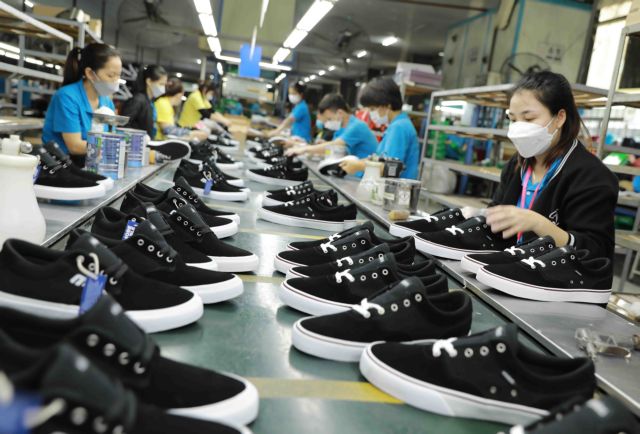 Economy
Economy

HÀ NỘI — Vietnamese businesses now have broader access to the United Kingdom (UK) market thanks to the UK-Vietnam Free Trade Agreement (UKVFTA). However, it is necessary to evaluate the implementation of the FTA to provide appropriate support policies for businesses to help them fully exploit current advantages.
Việt Nam News reporter Ly Ly Cao talks to Phan Thị Thanh Xuân, vice chairwoman and general secretary of the Việt Nam Leather and Footwear Association (Lefaso) about opportunities, challenges, and policy changes needed for enterprises in the industry.
 |
| Phan Thị Thanh Xuân, vice chairwoman and general secretary of the Việt Nam Leather and Footwear Association (Lefaso). VNS Photo Ly Ly Cao |
How has the UKVFTA affected leather and footwear companies after it came into effect?
When the UK was still a member of the European Union (EU), it was one of the EU's largest footwear importers, with an average share of 10-12 per cent. Therefore, Việt Nam's exports of footwear suffered significantly after Brexit.
Customers stopped signing new contracts or cut orders by half. Companies in the industry were really worried because it directly affected the proportion of Vietnamese leather and footwear exports to the entire EU.
However, there were signals of recovery when the country signed the UKVFTA. Export turnover to the UK market has grown again.
In the first half of 2022, the value of Vietnamese leather and footwear exports to the UK market increased by 10.9 per cent, according to Lefaso's semi-annual report.
During the period, exports of the industry climbed by 14.2 per cent over last year, totaling US$13.81 billion. Of this amount, footwear exports advanced by 13.3 per cent to $11.79 billion, while suitcase, bag, and briefcase exports jumped 20 per cent to $2.02 billion.
What challenges do enterprises in the industry face when exporting to the UK market?
The EU market in general and the UK market in particular are always fastidious customers. For Vietnamese businesses to successfully export to those markets, all regulations must be met, even in the production process.
For leather and footwear products exporting to the UK market, the requirements are mainly for leather-upper shoes. In terms of raw materials, Việt Nam has not been able to be self-sufficient in the source of high-quality leather for the production of leather footwear, so local producers have to find supplies in other countries, which is a great challenge.
On the other hand, in the near future, manufacturers will face even greater challenges with requirements for environmental protection and climate change as well as reducing carbon emissions and greenhouse effects on the production process.
All these requirements will result in norms of behaviour that factories must adhere to in order to successfully export. The internal capacity of enterprises needs a lot of improvement to meet those requirements.
 |
| Workers at a factory of Hà Tây Chemical - Weave Company Ltd. VNA/VNS Photo |
What does Lefaso propose to the authorities to help the industry increase the efficiency of implementing the UKVFTA in the future?
With the UKVFTA coming into effect, the market opening has been an initial success. The next step is to cooperate to improve enforcement capabilities.
The agreement has forged very strong links between government organisations and businesses as both parties must work together to effectively take advantage of opportunities.
Lefaso argues that not only with the UKVFTA in particular but also with other FTAs in general, after the trade treaties take effect, there should be an assessment or review process to continue to enhance and support businesses in a timely manner.
The assessment, which will be used to inform the introduction of new policies to boost utilisation, can be done annually or every three to five years.
Joining an FTA is considered traveling on a highway.
Not all businesses in the leather and footwear industry can take advantage of the opportunities. For businesses that have not utilised opportunities from FTAs, it is also necessary to have policies to promote and support these businesses to improve capacity. This is often done by improving the quality of human resources, thereby expanding the door for businesses. Particularly in the new situation, businesses will have to meet numerous very high standards from the import markets because when tariff barriers are reduced, non-tariff barriers will be increased.
Lefaso hopes that policies in the future will focus on supporting businesses so that companies can not only update information but also address weaknesses and develop strategies to seize opportunities.
How can enterprises adapt to the change to the UKCA mark from the CE mark?
The UK Conformity Assessed (UKCA) mark, which is mandatory for exported industrial goods to the UK starting next year, will replace the Conformité Européene - European Conformity (CE) mark of the EU since the UK left the bloc in 2020.
The change will certainly result in extra expenses for businesses as they have to update information and adjust their production processes to meet new requirements.
However, enterprises in the industry have foreseen this change since Brexit, so they have prepared. — VNS




